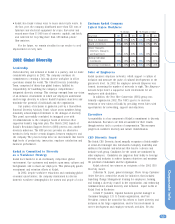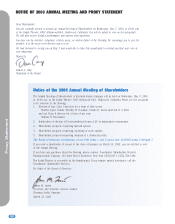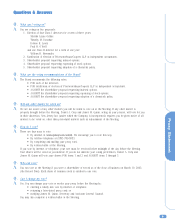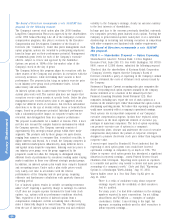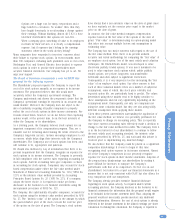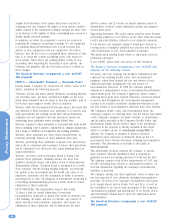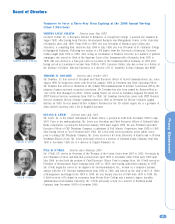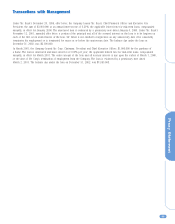Kodak 2002 Annual Report Download - page 90
Download and view the complete annual report
Please find page 90 of the 2002 Kodak annual report below. You can navigate through the pages in the report by either clicking on the pages listed below, or by using the keyword search tool below to find specific information within the annual report.
Proxy Statement
85
MANAGEMENT PROPOSALS
ITEM 1 — Election of Directors
Kodak’s By-Laws require us to have at least nine directors but no
more than 18. The number of directors is set by the Board and is
currently 12. Mr. Carp is the only director who is an employee of
the Company. The Board is divided into three classes of directors
with overlapping three-year terms. There are four Class I
directors whose terms expire at the 2003 Annual Meeting.
Nominees for election as Class I directors are:
Martha Layne Collins
Timothy M. Donahue
Delano E. Lewis
Paul H. O’Neill
These nominees agree to serve a three-year term. Mr. O’Neill was
a director of the Company from December 1997 to December
2000 and rejoined our Board of Directors effective February 19,
2003. Gov. Collins and Messrs. Donahue and Lewis were
previously elected by shareholders. Information about them is
provided beginning on page 89.
The nominee for election as a Class II director is:
William H. Hernandez
The nominee agrees to serve a one-year term. Mr. Hernandez
joined our Board of Directors effective February 24, 2003, and is
standing for election by you for the first time. Information about
him is provided beginning on page 90.
If a nominee is unable to stand for election, the Board may
reduce the number of directors or choose a substitute. If the
Board chooses a substitute, the shares represented by proxies
will be voted for the substitute. If a director retires, resigns, dies
or is unable to serve for any reason, the Board may reduce the
number of directors or elect a new director to fill the vacancy.
This new director will serve until the next Annual Meeting.
The Board of Directors recommends a vote FOR the
election of directors.
ITEM 2 — Ratification of Election of Independent
Accountants
PricewaterhouseCoopers LLP has been the Company’s independent
accountants for many years. The Board, on the recommendation of its
Audit Committee, elected PricewaterhouseCoopers LLP the Company’s
independent accountants to serve until the 2004 Annual Meeting.
Representatives of PricewaterhouseCoopers LLP will attend
the Meeting to respond to questions and, if they desire, to make
a statement.
The Board of Directors recommends a vote FOR the
ratification of election of PricewaterhouseCoopers LLP
as independent accountants.
SHAREHOLDER PROPOSALS
ITEM 3 — Shareholder Proposal — Indexed Options
Plumbers & Pipefitters National Pension Fund, 103 Oronoco St.,
Alexandria, VA, 22314-2105, owner of 15,400 shares, submitted
the following proposal:
“Resolved, that the shareholders of Eastman Kodak (the
“Company”) request that the Board of Directors adopt an
executive compensation policy that all future stock option grants
to senior executives shall be performance-based. For the
purposes of this resolution, a stock option is performance-based if
the option exercise price is indexed or linked to an industry peer
group stock performance index so that the options have value
only to the extent that the Company’s stock price performance
exceeds the peer group performance level.
Statement of Support: As long-term shareholders of the Company,
we support executive compensation policies and practices that
provide challenging performance objectives and serve to motivate
executives to achieve long-term corporate value maximization
goals. While salaries and bonuses compensate management for
short-term results, the grant of stock and stock options has
become the primary vehicle for focusing management on achieving
long-term results. Unfortunately, stock option grants can and do
often provide levels of compensation well beyond those merited.
We believe it has become abundantly clear that stock option
grants without specific performance-based targets often reward
executives for stock price increases due solely to a general stock
market rise, rather than to extraordinary company performance.
This resolution advocates performance-based stock options. It
defines performance-based stock options as indexed options
whose exercise price moves with an appropriate peer group index
composed of a company’s primary competitors. It should be noted
that there are other forms of indexed options that use other
types of market indices. The resolution requests that the
Company’s Board ensure that future Company stock option plans
link the options exercise price to an industry performance index
associated with a peer group of companies selected by the Board,
such as those companies used in the Company’s proxy statement
to compare 5 year stock price performance.
Implementing an indexed stock option plan would mean that our
Company’s participating executives would receive payouts only if
the Company’s stock price performance was better than that of
the peer group average. By tying the exercise price to a market
index, indexed options reward participating executives for
outperforming the competition. Indexed options would have value
when our Company’s stock price rises in excess of its peer group
average or declines less than its peer group average stock price
decline. By downwardly adjusting the exercise price of the option
during a downturn in the industry, indexed options remove
pressure to reprice stock options.
At present, stock options granted by the Company are not indexed
to peer group performance standards. As long-term owners, we
feel strongly that our Company would benefit from the
implementation of a stock option program that rewarded superior
long-term corporate performance. In response to strong negative
public and shareholder reactions to the excessive financial
rewards provided executives by non-performance based option
plans, a growing number of shareholder organizations, executive
compensation experts, and companies are supporting the
implementation of performance-based stock option plans such as
that advocated in this resolution. We urge your support for this
important governance reform.”
Proposals to be Voted On



